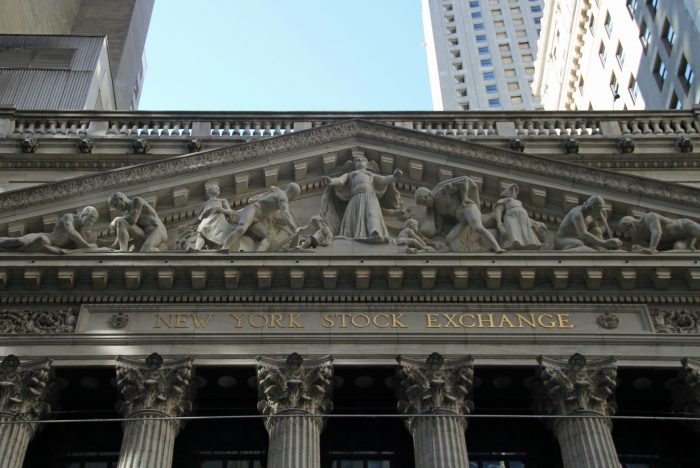By Daniel Dunaief
Rain can put a damper on life, as the two children at the beginning of Dr. Seuss’s The Cat in the Hat shared and as the itsy bitsy spider that went up the water spout only to get washed out again discovered.
As it turns out, rain, clouds, wind and foul weather can reduce the trading decisions of people who buy and sell large sums of money in stocks, as they grapple with their own reactions to clouds that they’d like to go away and come again some other day.

Danling Jiang, associate dean of research and faculty development in Stony Brook University’s College of Business; Lin Sun, Assistant Professor at George Mason University; and Dylan Norris, Assistant Professor at Troy University recently published a study in which they explored the effect of cloudy or inclement weather in the two weeks before an earnings surprise on investor reactions.
Every three months, public companies provide a detailed disclosure of their profits and losses, giving investors a chance to look over the equivalent of a quarterly report card.
Like helicopter parents who monitor every line, sentence and word in a report card, institutional investors tend to have a stronger reaction, either positively or negatively, if those numbers are considerably different than they expected. An “A” in advanced calculus might be like profits that exceed estimates by 10 percent, while a “C” might be the equivalent of an unexpected loss in a business that had been doing well.
As it turns out, institutional investors are less likely to react as strongly, at least initially, to an earnings surprise if the skies in the two weeks before they review the earnings announcements are cloudy or unpleasant.
“We find strong supporting evidence in our empirical tests which reveal increases in the pre-announcement unpleasant weather of institutional investors results in muted immediate market responses to earnings news and amplified port-earnings-announcement drifts,” Jiang explained in an email.
Over the course of two to three months, the stock price reflects a more typical pattern that aligns with the direction of the earnings surprise.
The researchers published their work in the Journal of Corporate Finance.
These results, which came from an analysis of reactions to earnings surprises from 1990 to 2016, validate and extend previous efforts to understand how weather affects investor decisions.
Earlier studies revealed the effects of weather on individuals’ psychological and physiological states, according to Jiang.
“These effects have also been shown to influence financial decisions and security prices, even through the actions of sophisticated market participants such as market makers and security analysts,” she said.
The three academics started working together when Lin and Jiang were faculty and Norris was a PhD student at Florida State University.
“We were fascinated by the idea present in prior research that weather seems a perfect exogenous shock to investor psychology and physiology,” said Jiang. “This exogenous feature allows us to draw some causality of psychology on market pricing in a new setting with institutional investors and earnings announcements.”
The researchers chose the years 1990 to 2016 because they had the data in their possession.
“We tried to ensure that our sample period was long enough to confirm the weather effect was a persistent force throughout time and not merely a phenomenon of a small segment in time,” said Jiang who added that solving the weather-related muted effect by adding brighter lights to a trading floor could backfire, as excessive bright lights can have negative effects.
“Overillumination can cause fatigue, stress and anxiety,” she explained. “It is also likely that most traders are subject to the weather at some point during the day” through arriving at work, leaving for lunch or glancing out the window. That means the weather still likely influences them even when they may be in a brightly-lit indoor setting.
The researchers used two measures of weather conditions. One integrated wind, cloud and rain, and the other used cloud cover only. Both measures produced similar findings.
Using earlier studies and their own research, it appears accounting for the combined effect of simultaneous weather parameters or focusing on cloud cover better captures any physiological or psychological effects as opposed to using wind or rain alone, said Jiang.
Public companies are unlikely to trigger a more muted response to earnings surprises by recruiting investors from areas with greater cloud cover, as prior research demonstrated that seasonal climate norms don’t appear to affect the behavior of investors once they acclimate, so to speak, to the weather.
In addition to the 14-day window to create the weather measures, the researchers generated a seven-day measure that showed similar results.
Announcement day weather may also affect market reactions to earnings news and “we do not discredit its importance,” Jiang said. Indeed, other research has shown that the weather in New York City at the time of an earnings announcement impacts market reactions.
The explanation for the muted reaction to earnings is based on psychological and physiological reactions of institutional investors to weather, including anxiety and sadness as well as fatigue and decreased activity.
“In addition to causing delayed information processing, weather could cause a reduction in energy amongst some traders,” said Jiang
That means institutional investors may struggle with the same factors that made the boy and Sally from The Cat in the Hat struggle while it was “too wet to go out and too cold to play ball. So we sat in the house, we did nothing at all,” Dr. Seuss wrote.
While institutional investors don’t do nothing at all, they are less active, at least according to the recent research, than they are when the sun shines brightly, reliably and more consistently.





